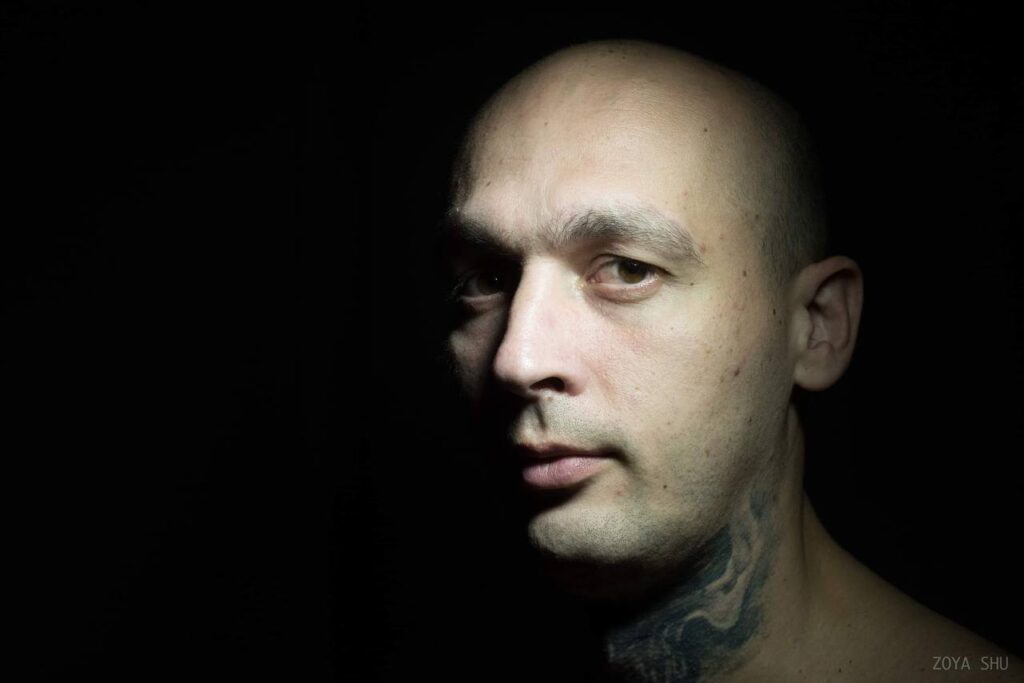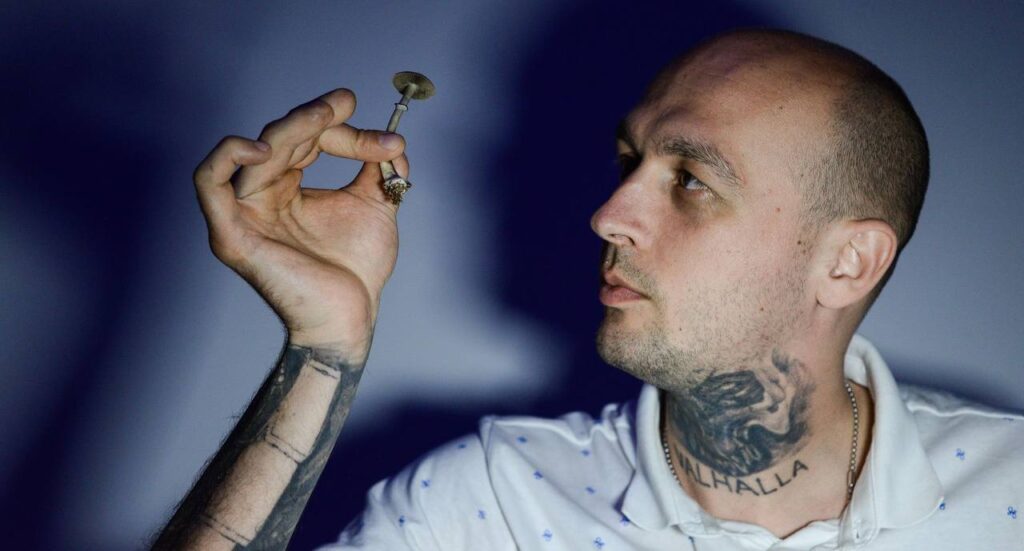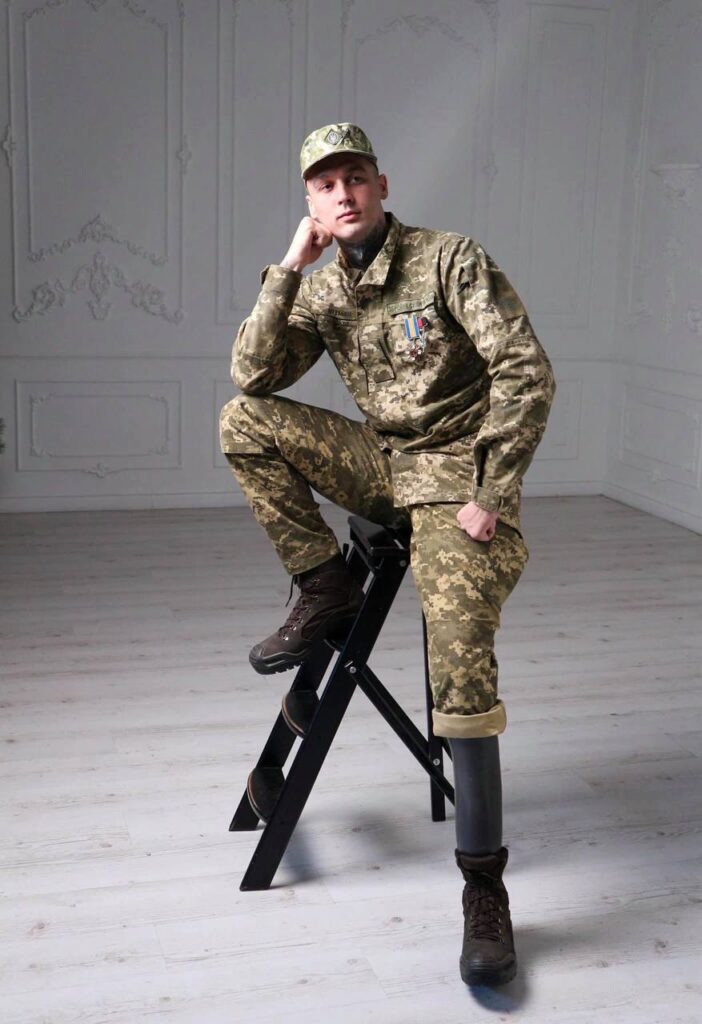While defending Ukraine, Stas received four severe combat wounds: three bodily wounds (including amputation of a leg) and one “invisible”, mental wound. Doctors suspected Stas had cancer, but it turned out to be military PTSD. We talked to the volunteer about how antidepressants didn’t help (which can’t be said for mushrooms), liberalisation of right-wing straightedges, self-stigmatisation of the military and why to treat what can’t be seen.
Stas, 33.
“Blamed myself for the death of my best friend…”
I was born in Moldova but I have been living in Ukraine for a long time. Since childhood I was against communism and Russian influence, besides, my family cultivated love for their country and readiness to help others – that’s why I started defending Ukraine’s independence.
In early 2015, I joined the Azov battalion, took a young fighter course (most of the instructors were citizens of Belarus), and participated in the battles for Shyrokyne. In summer, the battalion was taken off the front line and I was transferred to the press service of the headquarters, where I worked for six months, trying to convince myself that information warfare is also a weapon (it didn’t work). And then they passed a law allowing volunteers to serve in the AFU, and I joined the 25th battalion “Kyivska Rus”.
Then there were fights for Popasna, Troitske, Svitlodarsk Arc and in the direction of Bakhmut. I received three wounds. After the first heavy one I returned to the war because of my best friend who died: I wanted to take revenge, as I blamed myself for his death. This man was very dear to me. That day we were ambushed: we were being hunted. He was shot in the neck, I was shot in the leg and stomach. I saw blood coming from his neck. We were able to be evacuated, and then, as I was losing consciousness, I thought: I wish God had taken me instead of him. Because he was better… After the second wound, I was back on the front line, and after the third, I was written off.

Then I faced the “invisible wound”: post-traumatic stress disorder.
The first signs of PTSD appeared in late 2019. I stepped out of the subway, it was winter, everyone was warmly dressed – and I was hot and sweat was pouring down. Took off my jacket, unbuttoned my shirt – didn’t help. Then I bought antiviral medications and went to bed: it seemed like a common cold. After a few days on bed rest, it got a little easier, and I decided to go to the gym.
I remember how I sat down on the exercise bike, and just two minutes later there was a puddle on the floor beneath me, and inside I was very anxious. Something was wrong – but what? I think this is my first panic attack. And so, if anyone recovered from sports, it didn’t work for me.
Next came severe apathy and depression. Everything happened during law school: then I had to stay at home because of online learning. I often lacked the strength to get out of bed, take out the trash, buy bread or cook dinner for my girlfriend. We lived together, and I understood how difficult it was for her to see me in such a state – but I could not do anything.
Then I went to the doctors. The general blood test showed leukocytosis: this was due to the removal of the spleen on the background of the wound, but the doctors suspected oncology. There was also something that did not fit into the picture of cancer: obsessive thoughts and fear of persecution (constantly turning around on the street). Then I was sent to a psychiatrist.
It was a blow: I am a strong and calm warrior.
A psychiatrist at the Kyiv military hospital prescribed me antidepressants. Panic attacks seemed to have lost their intensity, but they were there, and the pills just “muted” them. On top of that, I gained weight on the antidepressants, and the load on the joints of my amputated leg increased.
So when I felt better, my doctor and I decided: it’s time to get off the pills. In the summer of 2021 I stopped taking them and by the end of August the panic attacks (with a strong cough and a feeling of suffocation) resumed. The doctor advised me to return antidepressants, but I realised that this is not the solution to the problem.
The cognitive realm took a hit, going to law school became increasingly difficult….. I had heard about PTSD, read about how American veterans get used to suffering and live like this until they die. The road to recovery promised to be long and difficult – but I believed that he who seeks will find.
A friend of mine shared the contacts of a specialist. At first we talked with him about the outcast topics, his confidence and calmness inspired trust. Towards the end, I asked about the method of treatment. The answer shocked me:
“I treat with mushrooms”.

On the one hand, in Moldova I was an active member of the Right Movement and a straightedge person, I did not use substances (I smoked pot only once in my life) and fought against drugs. On the other hand, I really wanted to get cured.
Then the therapist advised me to google “psychedelic therapy for PTSD” in English. I expected to find a couple or three articles, but it turned out that there were a bunch of clinical studies confirming the effectiveness of psychedelic substances. Not thinking long, I agreed to the therapy, although I had no idea what to expect.
The session took place in a special room: a lot of paintings, soft cloth walls – in short, everything for a magical atmosphere and a sense of security. I took the mushrooms. In a few minutes the first effects appeared. I felt uneasy. I asked the therapist if it could be stopped, but he calmed me down, reminding me that I was a fighter in life and could handle it. So I lay down, closed my eyes and soon saw my best friend…..
Love and joy at his appearance. He greets: “Come on, I’ll show you!” – and runs towards the enemies. I want to go with him, but I can’t run: “Ilya, I don’t have a leg…” – “It’s okay, you’ll grow a new one from the mushrooms!” And I grow a leg. We run, there are snow drifts all around. When we’re almost near the enemies, the “camera”, like in a movie, quickly approaches, swallowing us up.
I’m in a small particle of snow and I feel like I’m passing into another world. Before his death, Ilya asked to be cremated and have his ashes scattered over a river in the Donetsk region: he loved this place very much…. I realise that my friend is even in a molecule of snow because of “the natural cycle of substances”, it is as if he is everywhere.
Ilya asks why I blame myself. He says: “I’m here, I’m fine, Don’t worry. What you’re making up for yourself is making me miserable'”. Here his wife appears and he says, “See, I’m here with her, we’re fine”.
In reality, his wife is alive and fighting on the Bakhmut direction. I ask if I can tell her about this experience so that she can be with him too. But Ilya replies that everything has its time.
I find myself in another world and literally talk to God, he changes my consciousness. He gives me love, and it is the most powerful experience, something inexplicable, beyond words. God explains that we are not here to kill and fight. He warns me that if I pick up a gun, the PTSD will return. I have severe anxiety…
I ask God what to do about the panic attacks. The Creator swipes my back – and the sweat dries up, the fever goes away. “There will be no more panic attacks, get up”. That was the last and most magical moment of the experience. I stood up and it was over.

“For the next two years, no antidepressants were needed…”
When I woke up the next morning, everything was different: lots of energy, confidence and a desire to live. It was as if an extinguished fire had been rekindled inside, but because of my prejudice against substances, it seemed temporary. I checked with the psychotherapist whether it was necessary to repeat the experience every month (and I would not want to: it is not easy to live a thousand lives with every cell of my body) – it turned out that it was not necessary.
Then there was a process of integration after the psychedelic experience: drawing, writing about the experience. And I actually felt better. Even sports used to cause me panic attacks, but after therapy I ran five kilometres – and nothing terrible happened. I went to the gym, did some weights, and I was fine. I thought, “That’s magic”. At the jive-jitsu classes I didn’t have panic attacks either: have I recovered? Two years have passed since then, and during that time I haven’t taken a single antidepressant pill.
True, after the full-scale invasion (I was again defending Ukraine on the front line), my mental health deteriorated. But I left Azov and became an instructor for the military – and soon fully recovered mentally.
Therapy not only helped me cope with PTSD, but also changed my views. After the experience, I became more liberal, less aggressive, and in general – revised my attitude to life. Psychedelics taught me to respect other people’s spiritual experience, not to divide by skin colour and orientation. How can I, so small compared to God, influence others? Everyone has the right to their own path.
But psychedelics are not a miracle pill or a magical solution to problems.
Do not expect instant healing: it is a specific therapy that requires special conditions and skills to be carried out. The therapist must adequately assess the client’s readiness: Yes, at first I was delighted, but now I realise that it is not for everyone (for example, immediately after a serious loss it is better not to take risks, it can intensify the trauma). In short, such methods should be used with caution and only if you have already tried other methods of treatment.
The attitude towards PTSD in the AFU is still sceptical: why treat something you can’t see (especially for money)? As a result, the military keeps quiet for fear of judgement and stereotyping (“everyone will think I’m crazy”). I want PTSD to finally be talked about, the Ministry of Defense to pay attention to the problem, and for Ukraine to legalise and stop stigmatising psychedelic therapy.


